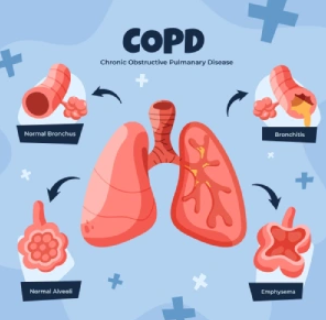Some COPD sufferers only use oxygen while exercising or sleeping. Others frequently breathe oxygen. The only COPD treatment that has been shown to lengthen life is oxygen therapy, which can enhance the quality of life. If you smoke, the most effective treatment for COPD is to stop smoking.

Get Vaccinated: By getting vaccinated, you lower your chance of getting pneumonia and heart issues, two significant complications that can arise from getting the flu. Additionally, you should confirm that your coronavirus vaccinations are valid.
Pulmonary rehabilitation: For those who have COPD, there is a regimen called pulmonary rehabilitation (PR), which combines exercise and education. It is among the finest solutions for treating COPD.
Look after other medical conditions: Most COPD sufferers also have one or more additional chronic medical disorders. Examples include diabetes, heart disease, osteoporosis, joint problems, muscles, as well as depression and anxiety.
Oxygen Therapy: Only those with low oxygen levels can benefit from oxygen therapy. Breathlessness in persons whose oxygen levels are normal is not relieved by it.
Non-invasive ventilation: The inability of patients with severe COPD to remove carbon dioxide waste products from their lungs can occasionally make you feel ill. Non-invasive ventilation may be recommended if you are admitted to the hospital with a severe flare-up of your ailment and excessive carbon dioxide levels.
Lung volume reduction procedures: The amount of trapped air in the lungs is reduced by lung volume reduction techniques. Only 1-2% of COPD sufferers who are candidates for the treatments can benefit from them, and only those with emphysema can benefit from them.
Treatment Of COPD From Pharmacological To Instrumental Therapies

The two primary objectives of chronic obstructive pulmonary disease management are to reduce the impact of the disease on daily activities and reduce the risk of lung function exacerbations. The treatment of chronic obstructive pulmonary disease encompasses a range of therapeutic approaches, from pharmacological interventions to instrumental therapies. The primary component of the pharmacological management of COPD symptoms is bronchodilators, which relax the muscles of the airways and enhance breathing. When exacerbations occur, short-acting bronchodilators offer instant relief, while long-acting bronchodilators are used for daily maintenance.
These therapies aim to improve lung function and exercise capacity. By combining pharmacological treatments with instrumental therapies, healthcare providers can provide comprehensive and individualized care to patients with COPD, helping to manage symptoms, enhance lung function, and improve the overall quality of life.
